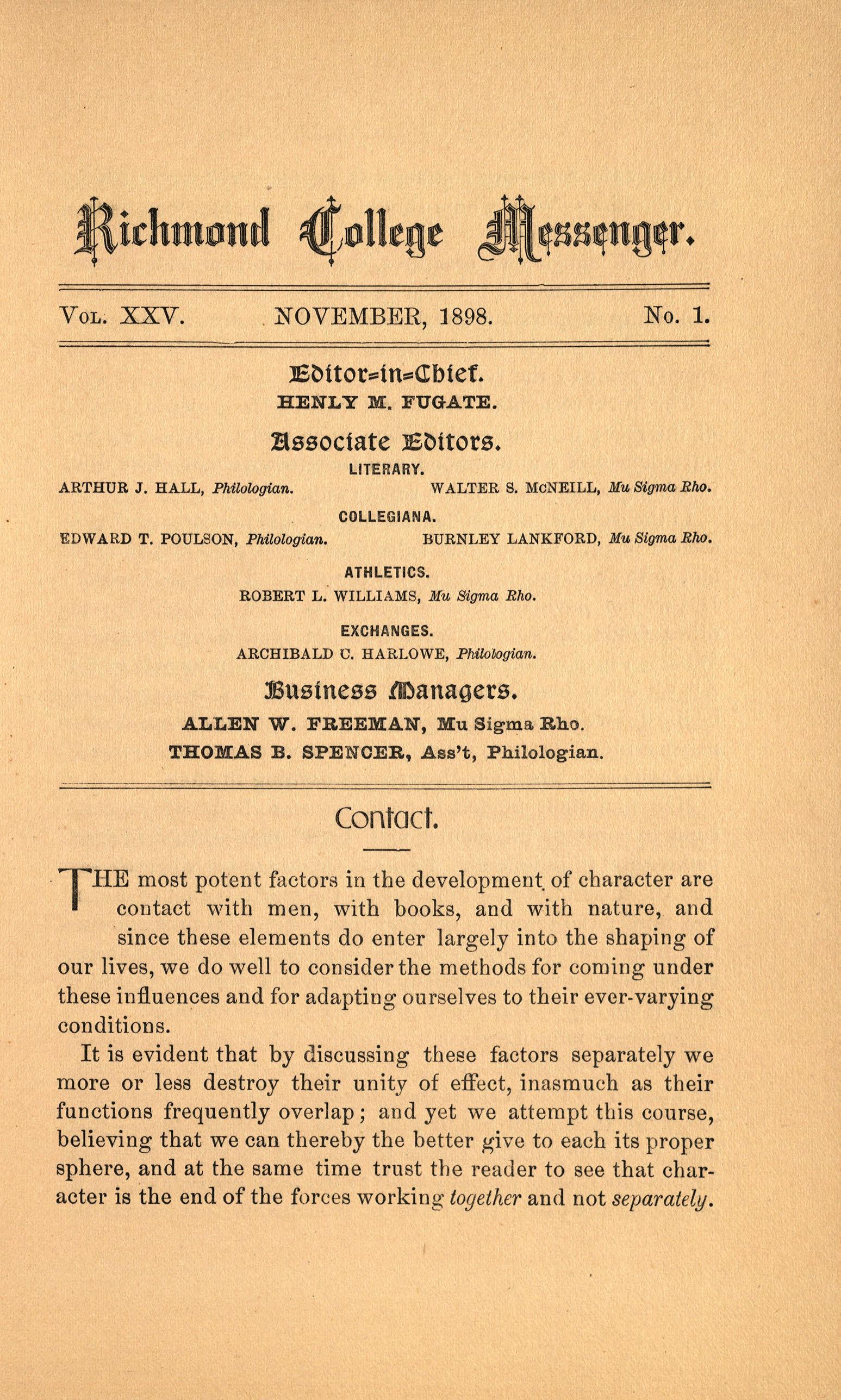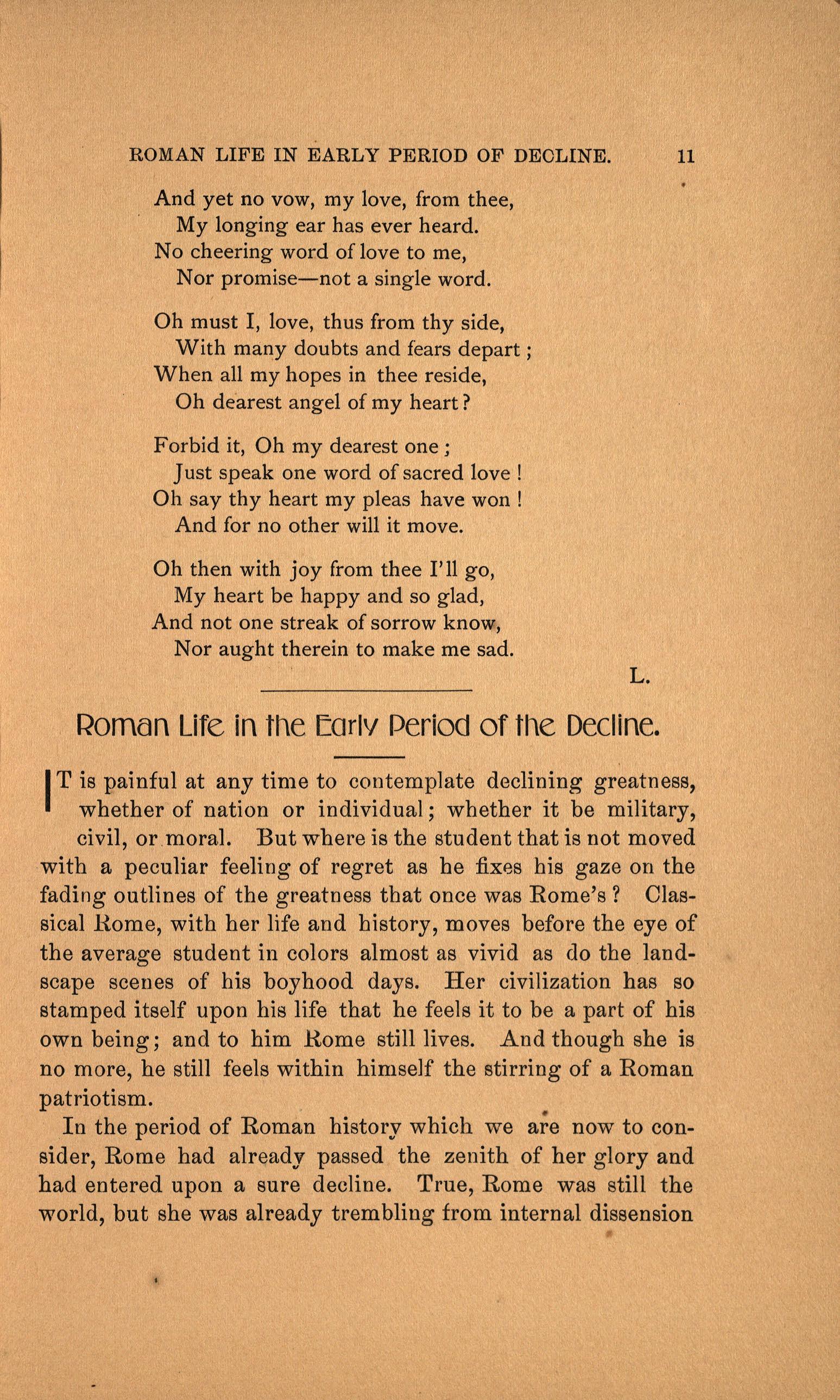
15 minute read
of the Decline
ROMAN LIFE IN EARLY PERIOD OF DECLINE .
And yet no vow, my love, from thee,
My longing ear has ever heard. No cheering word of love to me,
Nor promise-not a single word.
Oh must I, love, thus from thy side,
With many doubts and fears depart ; When all my hopes in thee reside,
Oh dearest angel of my heart?
Forbid it, Oh my dearest one;
Just speak one word of sacred love ! Oh say thy heart my pleas have won !
And for no other will it move.
Oh then with joy from thee I'll go,
My heart be happy and so glad, And not one streak of sorrow know,
Nor aught therein to make me sad.
L.
11
Roman Life in the Earlv Period of the Decline.
IT is painful at any time to contemplate declining greatness, whether of nation or individual; whether it be military, civil, or .moral. But where is the student that is not moved with a peculiar feeling of regret as he :fixes his gaze on the fading outlines of the greatness that once was Rome's? Classical Home, with her life and history, moves before the eye of the average student in colors almost as vivid as do the landscape scenes of his boyhood days. Her civilization has so stamped itself upon his life that he feels it to be a part of his own being; and to him Rome still lives. And though she is no more, he still feels within himself the stirring of a Roman patriotism.
In the period of Roman history which we a;e now to consider, Rome had already passed the zenith of her glory and had entered upon a sure decline. True, Rome was still the world, but she was already trembling from internal dissension
12 RICHMOND COLLEGE MEHSENGRR.
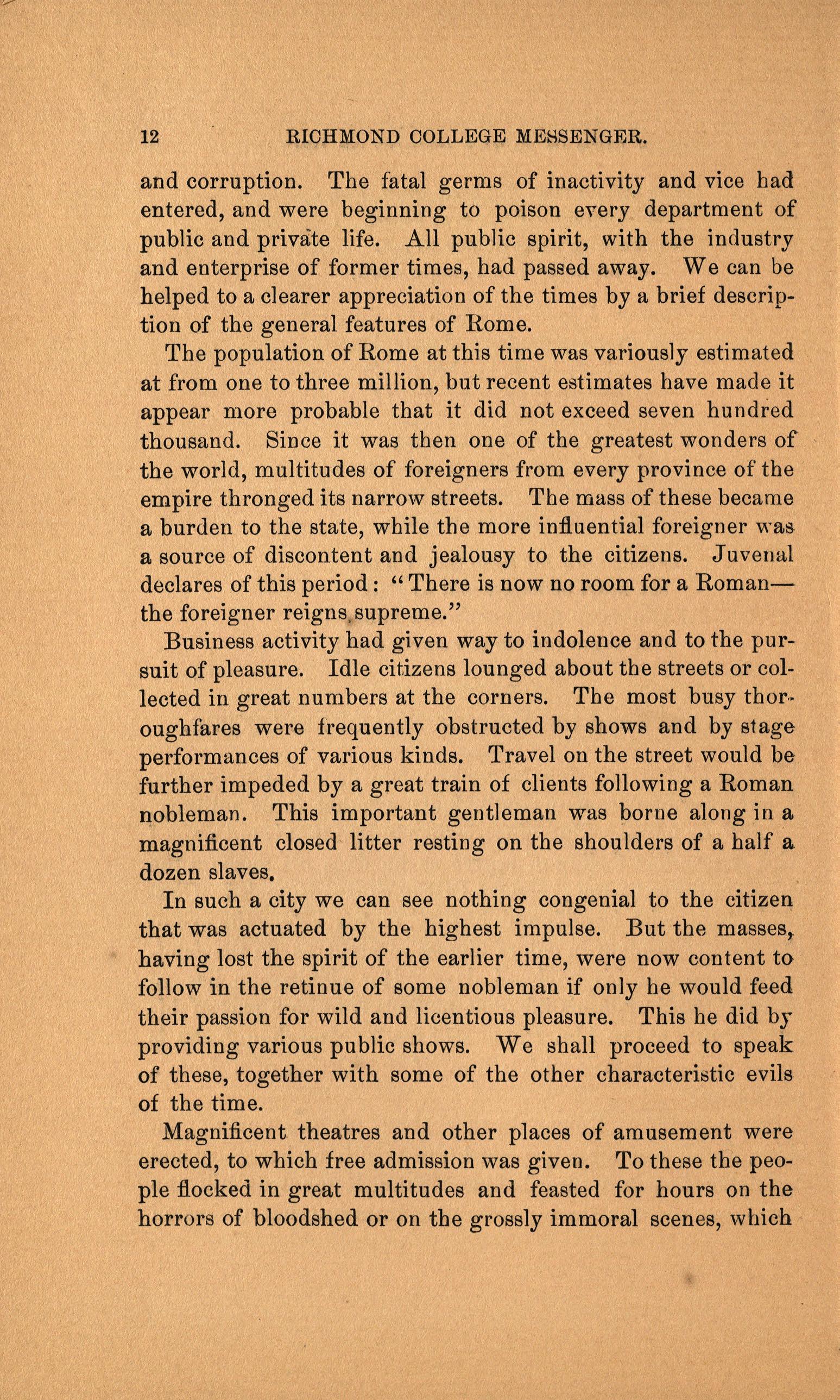
and corruption. The fatal germs of inactivity and vice had entered, and were beginning to poison every department of public and private life. All public spirit, with the industry and enterprise of former times, had passed away. We can be helped to a clearer appreciation of the times by a brief description of the general features of Rome.
The population of Rome at this time was variously estimated at from one to three million, but recent estimates have made it appear more probable that it did not exceed seven hundred thousand. Since it was then one of the greatest wonders of the world, multitudes of foreigners from every province of the empire thronged its narrow streets. The mass of these became a burden to the state, while the more influential foreigner was a source of discontent and jealousy to the citizens. Juvenal declares of this period : "There is now no room for a Romanthe foreigner reigns . supreme."
Business activity had given way to indolence and to the pursuit of pleasure. Idle citizens lounged about the streets or collected in great numbers at the corners. The most busy thor•- oughfares were frequently obstructed by shows and by stage performances of various kinds. Travel on the street would be further impeded by a great train of clients following a Roman nobleman. This important gentleman was borne along in a magnificent closed litter resting on the shoulders of a half a dozen slaves.
In such a city we can see nothing congenial to the citizen that was actuated by the highest impulse. But the massest having lost the spirit of the earlier time, were now content to follow in the retinue of some nobleman if only he would feed their passion for wild and licentious pleasure. This he did by providing various public shows. We shall proceed to speak of these, together with some of the other characteristic evils of the time.
Magnificent theatres and other places of amusement were erected, to which free admission was given. To these the people flocked in great multitudes and feasted for hours on the horrors of bloodshed or on the grossly immoral scenes, which
ROMAN LIFE IN EARLY PERIOD OF DECLINE. 13
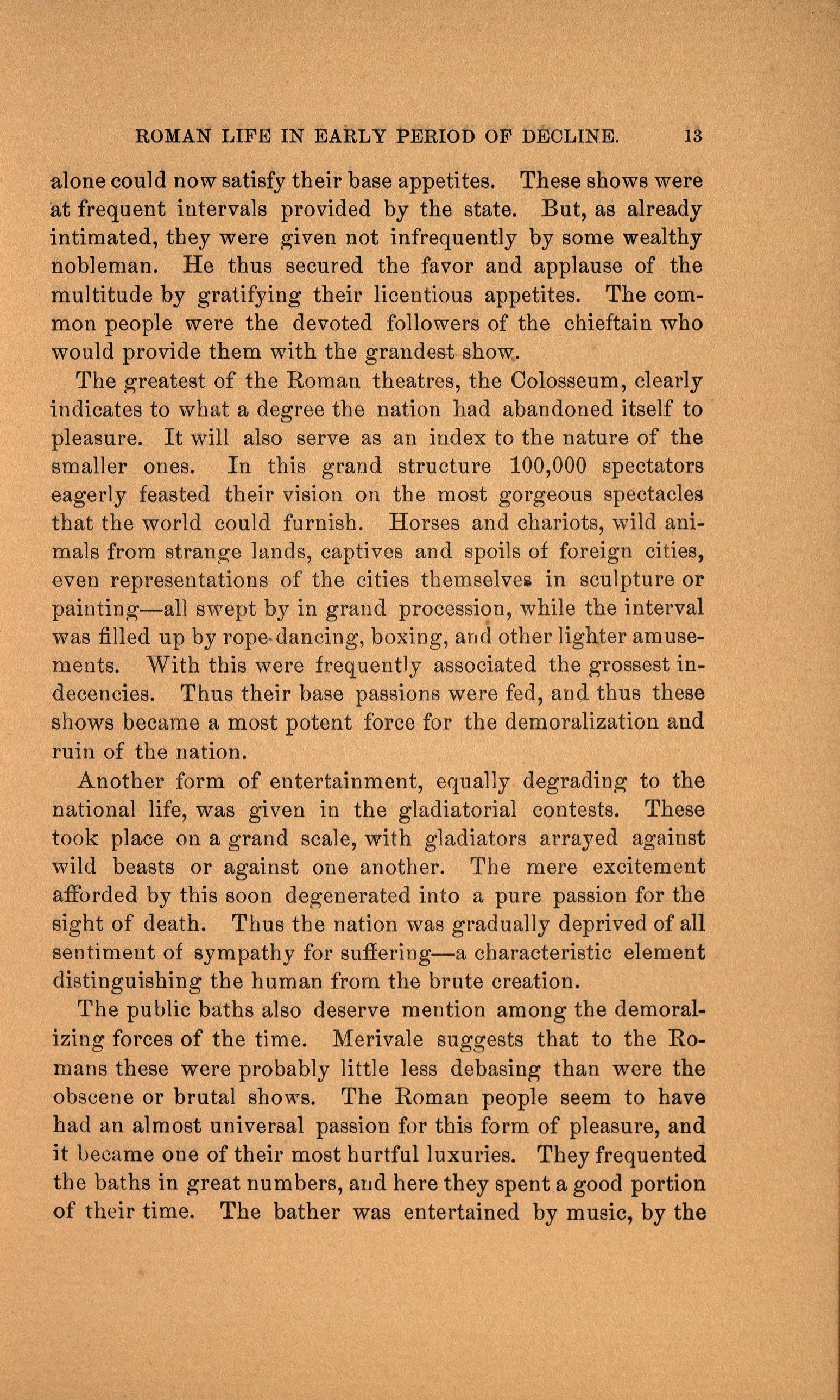
alone could now satisfy their base appetites. These shows were at frequent intervals provided by the state. But, as already intimated, they were given not infrequently by some wealthy nobleman. He thus secured the favor and applause of the multitude by gratifying their licentious appetites. The common people were the devoted followers of the chieftain who would provide them with the grandest show..
The greatest of the Roman theatres, the Colosseum, clearly indicates to what a degree the nation had abandoned itself to pleasure. It will also serve as an index to the nature of the smaller ones. In this grand structure 100,000 spectators eagerly feasted their vision on the most gorgeous spectacles that the world could furnish. Horses and chariots, wild animals from strange lands, captives and spoils of foreign cities, even representations of the cities themselveii in sculpture or painting-all swept by in grand procession, while the interval was filled up by rope -dancing, boxing, and other lighter amusements. With this were frequently associated the grossest indecencies. Thus their base passions were fed, and thus these shows became a most potent force for the demoralization and ruin of the nation.
Another form of entertainment, equally degrading to the national life, was given in the gladiatorial contests. These took place on a grand scale, with gladiators arrayed against wild beasts or against one another. The mere excitement afforded by this soon degenerated into a pure passion for the sight of death. Thus the nation was gradually deprived of all sentiment of sympathy for suffering-a characteristic element distinguishing the human from the brute creation.
The public baths also deserve mention among the demoralizing forces of the time. Merivale suggests that to the Romans these were probably little less debasing than were the obscene or brutal shows. The Roman people seem to have had an almost universal passion for this form of pleasure, and it became one of their most hurtful luxuries. They frequented the baths in great numbers, and here they spent a good portion of their time. The bather was entertained by music, by the
RICHMOND COLLEGE MESSENGER.
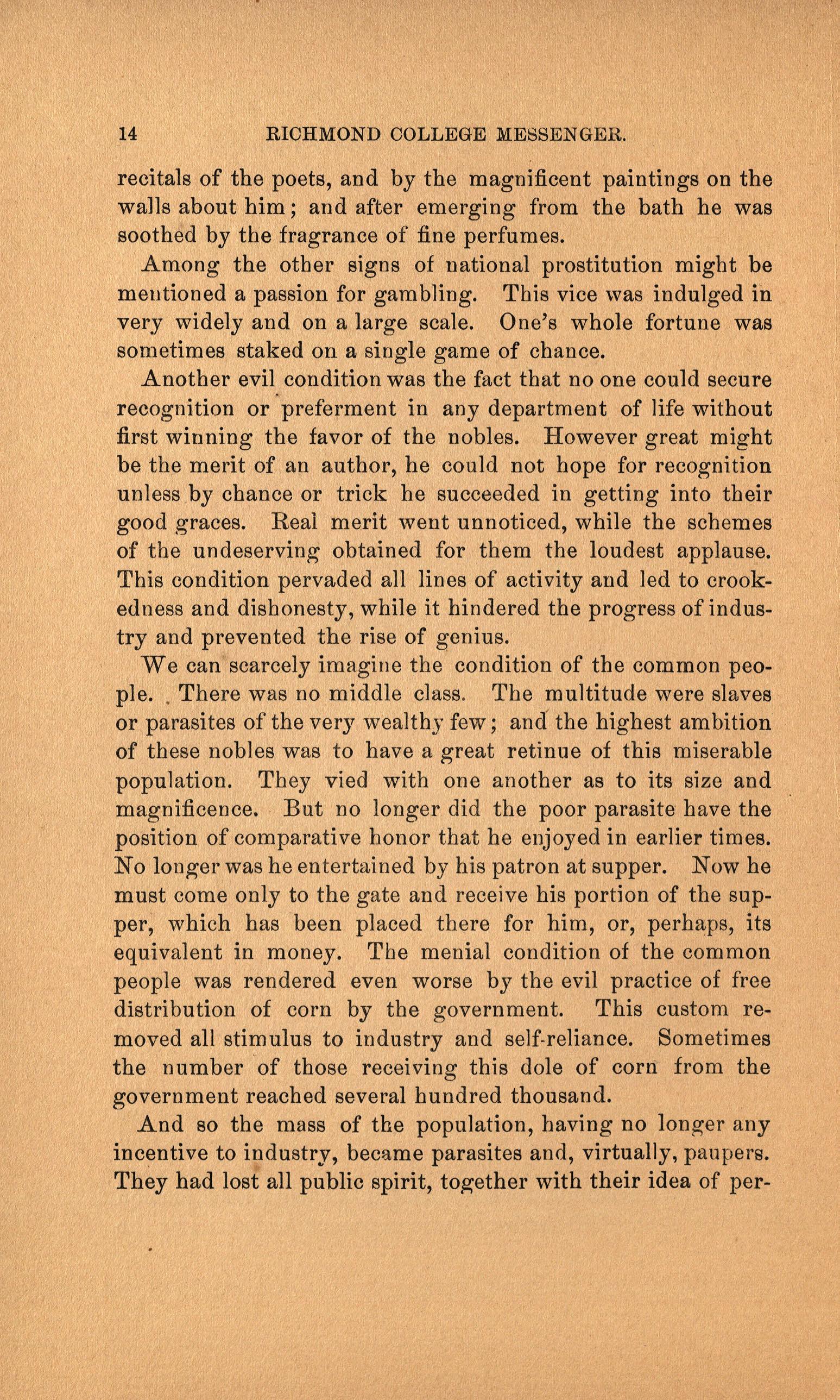
recitals of the poets, and by the magnificent paintings on the walls about him; and after emerging from the bath he was soothed by the fragrance of :fine perfumes.
Among the other signs of national prostitution might be meutioned a passion for gambling. This vice was indulged fo very widely and on a large scale. One's whole fortune was sometimes staked on a single game of chance.
Another evil condition was the fact that no one could secure recognition or ·preferment in any department of life without :first winning the favor of the nobles. However great might be the merit of an author, he could not hope for recognition unless by chance or trick he succeeded in getting into their good graces. Real merit went unnoticed, while the schemes of the undeserving obtained for them the loudest applause . This condition pervaded all lines of activity aud led to crookedness and dishonesty, while it hindered the progress of industry and prevented the rise of genius.
We can scarcely imagine the condition of the common people . . There was no middle class. The multitude were slaves or parasites of the very wealthy few; and the highest ambition of these nobles was to have a great retinue of this miserable population. They vied with one another as to its size and magnificence. But no longer did the poor parasite have the position of comparative honor that he enjoyed in earlier times. No longer was he entertained by his patron at supper. Now he must come only to the gate and receive his portion of the supper, which has been placed there for him, or, perhaps, its equivalent in money. The menial condition of the common people was rendered even worse by the evil practice of free distribution of corn by the government. This custom removed all stimulus to industry and self-reliance. Sometimes the number of those receiving this dole of corn from the government reached several hundred thousand.
And so the mass of the population, having no longer any incentive to industry, became parasites and, virtually, paupers. They had lost all public spirit, together with their idea of per-
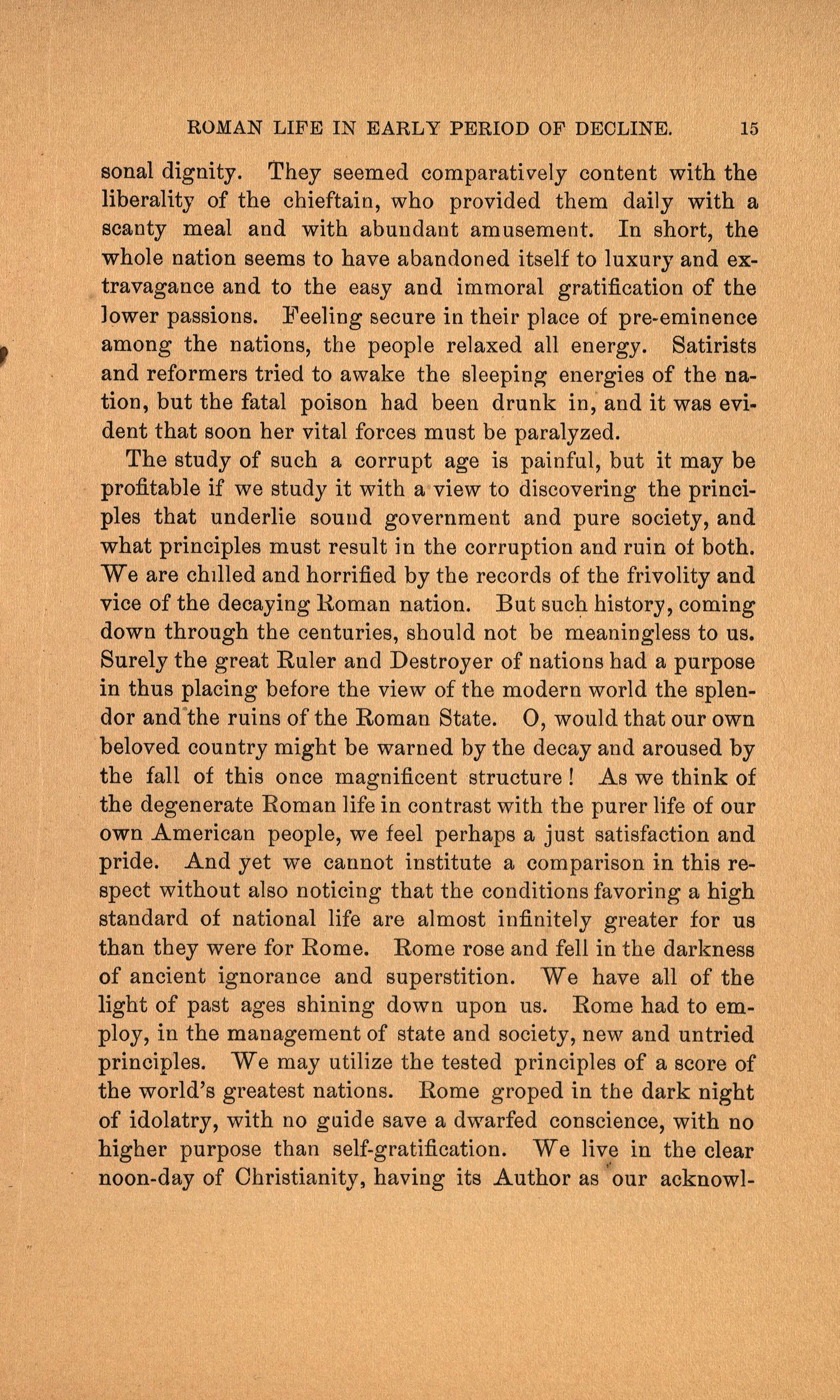
sonal dignity. They seemed comparatively content with the liberality of the chieftain, who provided them daily with a scanty meal and with abundant amusement. In short, the whole nation seems to have abandoned itself to luxury and extravagance and to the easy and immoral gratification of the lower passions. ]feeling secure in their place of pre-eminence among the nations, the people relaxed all energy. Satirists and reformers tried to awake the sleeping energies of the nation, but the fatal poison had been drunk in, and it was evident that soon her vital forces must be paralyzed.
The study of such a corrupt age is painful, but it may be profitable if we study it with a view to discovering the principles that underlie sound government and pure society, and what principles must result in the corruption and ruin of both. We are chilled and horrified by the records of the frivolity and vice of the decaying Homan nation. But such history, coming down through the centuries, should not be meaningless to us. Surely the great Ruler and Destroyer of nations had a purpose in thus placing before the view of the modern world the splendor and " the ruins of the Roman State. 0, would that our own beloved country might be warned by the decay and aroused by the fall of this once magnificent structure ! As we think of the degenerate Roman life in contrast with the purer life of our own American people, we feel perhaps a just satisfaction and pride. And yet we cannot institute a comparison in this respect without also noticing that the conditions favoring a high standard of national life are almost infinitely greater for us than they were for Rome. Rome rose and fell in the darkness of ancient ignorance and superstition. We have all of the light of past ages shining down upon us. Rome had to employ, in the management of state and society, new and untried principles. We may utilize the tested principles of a score of the world's greatest nations. Rome groped in the dark night of idolatry, with no guide save a dwarfed conscience, with no higher purpose than self-gratification. We live in the clear noon-day of Christianity, having its Author as ·· our acknowl-
16 RICHMOND COLLEGE MESSENGER.
edged Guide, and having His teaching to point us to the highest ideal the world has ever dreamed of. Considering all these facts along with our present national life, perhaps we would do well to ask ourselves whether or not we can yet boast of a pure government and pure society. s. L. MORGAN.
Valedictorv, '97-90.
Fellow-Students, Ladies and Gentlemen: It is with mingled feelings of joy and sadness that I appear on this old rostrum to-night, perchance, for the last time to appear before a Richmond audience. It is always sad to break in twain the ties that bind our hearts in friendship's strong embrace. And yet the pathway of life is scattered with meetings and parting s, with greetings and farewells.

"Life hath as many farewells As it hath sunny hours, And over some are scattered thorns, And over others flowers.''
We now see the curtain hanging in readiness to fall on the drama of '97-'8. After a few short days this session will be counted among the immutable, numberless things of the past. Soon will these halls that now resound with joyous tread and sweet-toned voices, be bathed in silence. Soon will the athletic arena be deserted by its ambitious contestants. The base-ball diamond will again array itself in verdant splendor. The tennis courts will repose in silence, awaiting the conflicts of the coming session. And yet, before this pending curtain shall fall, it devolves upon me to say farewell. "Fare the well ; and if forvever,
Still forever fare thee well.''
When in imagination we lead ourselves back to the day on . which we entered these classic walls, and retrace our steps from that fortunate day until the present, how varied do we · find our experiences to have been. While some have soared
VALEDICTORY, '97-98. 17
.-aloft on the asymptotes of an hyperbol~ and sought in vain to solve the mysteries of that realm of the infinite, where parallel lines meet and many other impossibilities take place, others have, with equal zeal and accuracy," pulled" the modest, peaceful "rat" from the arms of Morpheus, and heard from his mu- ·sically tremulous lips the melodious combination of recitation and song. By means of that infallible test known in the chemical world as sulphuretted hydrogen, some have most conclu- -sively proved that only blue blood flows in our veins. Others, using that same delightful test, have more easily proved that it takes our professor of physics only a short time to realize that he is not the only inhabitant of the scientific realm. Often, from nine in the morning until ten or eleven at night, have we indulged in those College luxuries called examinations, only to reap the enormous reward of 80 minus. But to these pleasures we must now say good-bye, some of us, perhaps, forever, others with fond anticipations of again partaking of th ese joys.
B ut sunshine follows rain. Mingled with the sorrow of adieus to so many fond ties is the pleasure that awaits us when the homeward journey is complete. "And now, ye waiting homes that listen to
The never restful wash of ocean waves ; Ye homes that dot the purple hills and rest Within the verdant vales of the bonny south; Ye homes that lie beside the far-away And rapid rushing rivers of the WestWreathe o'er the doors fresh boughs of mistletoe, And open wide your arms of love, for, with The fragrant summer-time the too-long absent Ones unto your bosom now return."
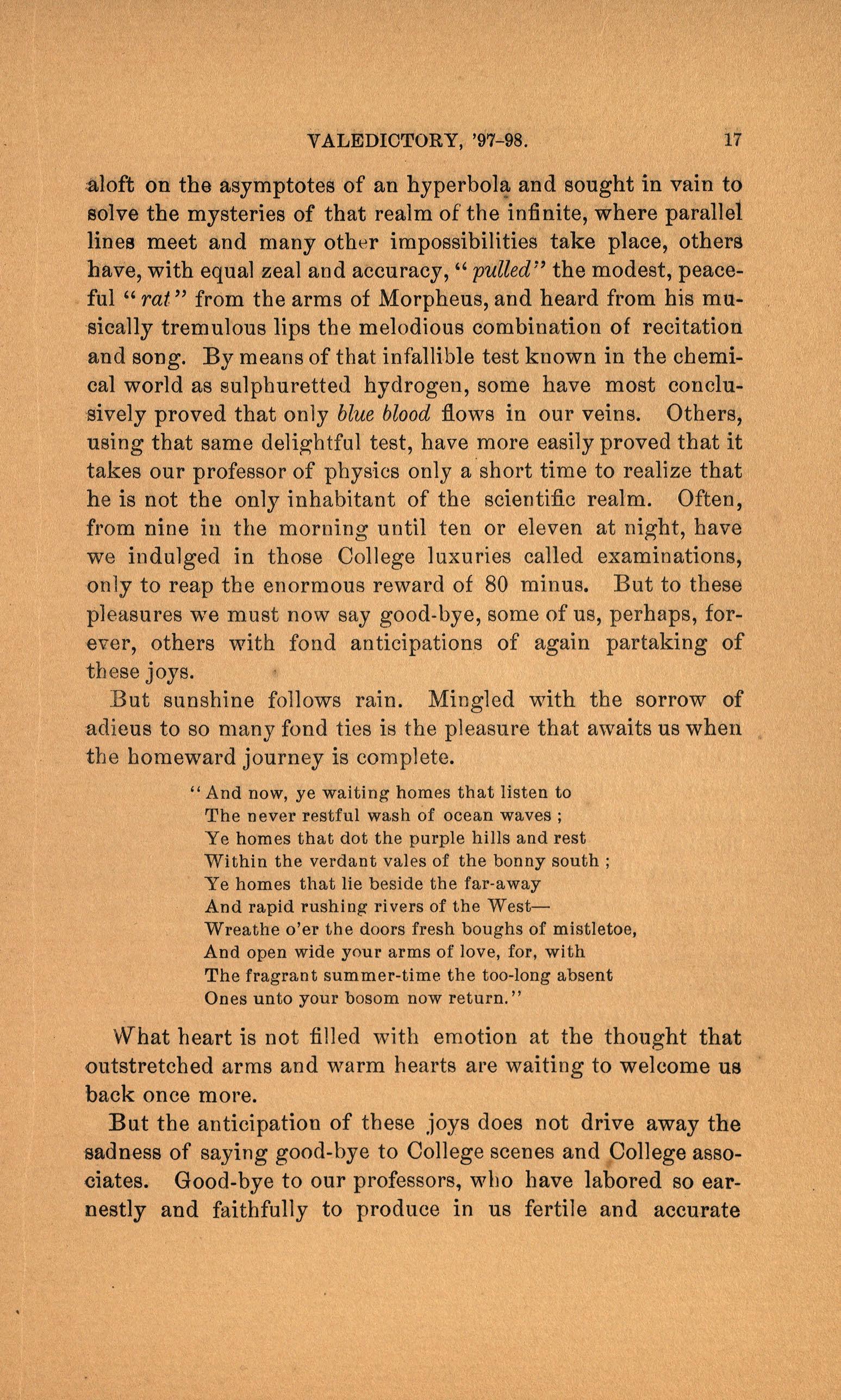
What heart is not filled with emotion at the thought that outstretched arms and warm hearts are waiting to welcome us back once more.
But the anticipation of these joys does not drive away the sadness of saying good-bye to College scenes and College associates. Good-bye to our professors, who have labored so earnestly and faithfully to produce in us fertile and accurate

minds; to develop us into the truest manhood; to put into our hands the compass that will ever direct us onward toward the harbor of honorable success. For your diligent labor we are profoundly grateful. Our debt of gratitude can never be paid, but we shall strive so to acquit ourselves in life that you shall look with satisfaction on our career. Good-bye to the societies, in whose halls we have received the inspiration that quickens our steps toward that ever. coveted goal, "honor and undying fame." If in after years success shall crown our efforts, we shall with pleasure return to your door and leave the reward that is so justly yours. Good-bye, fellow-students, who are to return to take another draught from the "Pierian Spring" of learning. On you shall fall the mantle that we now put down. May it be your lot to wear it with more grace and dignity than we have ever attained. Strive to make our imperfections a warning to direct your steps into more accurate paths. And now, my comrades, classmates, whose College career has only a few days of existence,• to you may I say one word? We, to-night, launch out on the dark: and uncertain sea of life. Before us life lays its glorious possibilities, its brightening hopes, its cheering prospects. And yet, who knows the future? To each one of us will the day of trial come. Our little bark will be tossed hither and thither on the surging waves. Problems that will demand all our latent powers will present themselves for solution. But for these hours of testing let us ever be thankful, for in these hours, and in these alone, do manhood and character have an opportunity to assert themselves. In joys and sorrows, in happiness and afflictions, let us ever show ourselves men,"men true and tried." Aud now to you, citizens of Richmond, you who have so often given us inspiration by your presence on such occasions as this, you who have so kindly thrown open the doors of your hospitable homes and bade us ever welcome-you, whose encouraging words have lifted us out of tbe pit of Despond at the moment when we so much needed your help-to you we wish to extend our heartfelt thanks and bid yon a fond and affection-
ate farewell. Long will the memory of your many kindnesses :find lodgement in our hearts. With the poet we say:
"We bid good - bye. No sweeter salutation
Can friendship claim, Nor yet can any language, any nation
A sweeter frame. It is not final ; it forebodes no sorrow,
As some declare, Who, born to fretting, are so prone to borrow
To-morrow's share .
Good-bye I Yes, 'God be with you !' prayer and blessing
In simplest phrase, Alike our need and his dear care confessing
In all our ways.
However rare or frequent be our meeting,
However nigh The last long parting or the endless gre e ting,
We bid good-bye." w. L. PRINCE.
~ssurance.
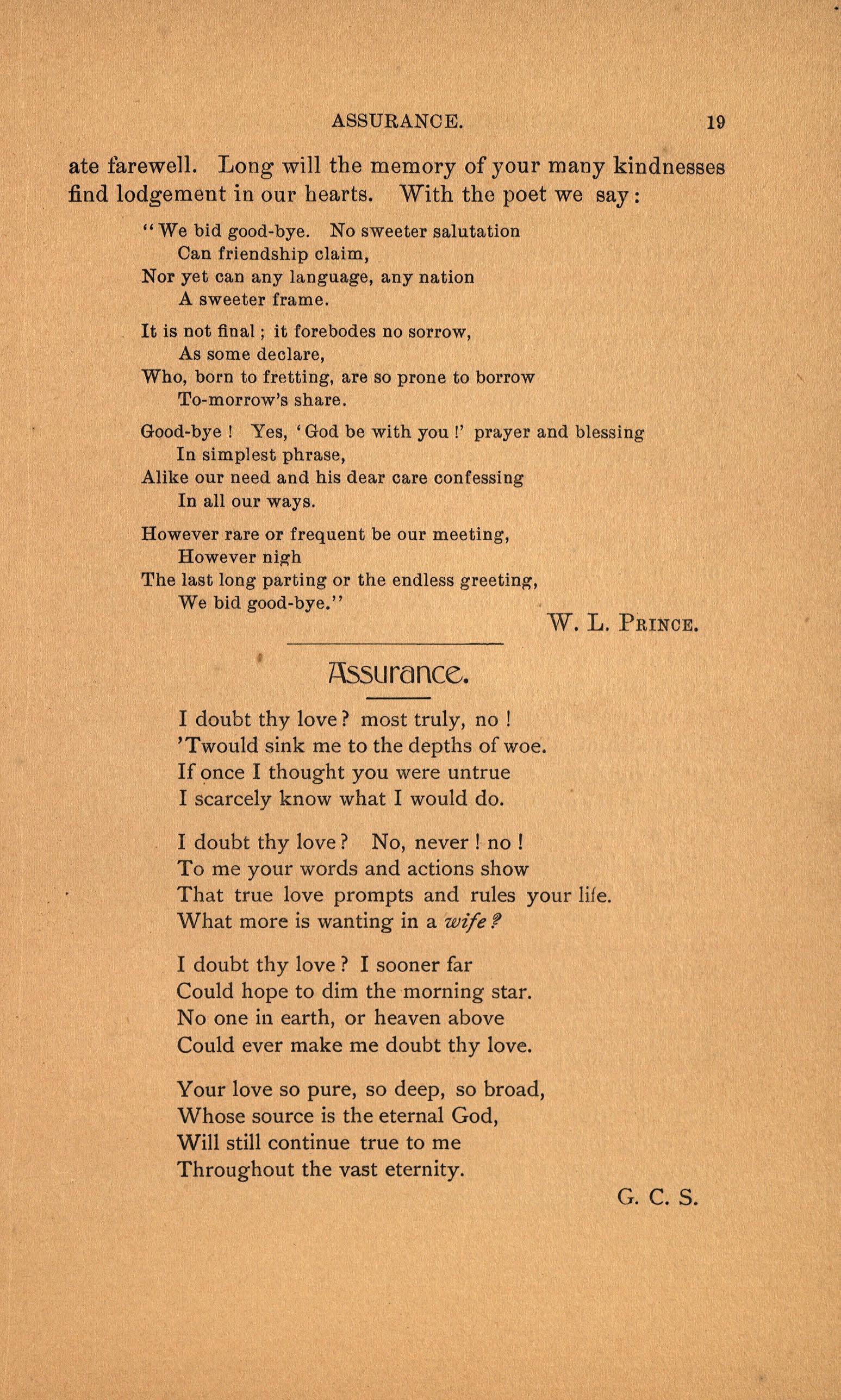
I doubt thy love? most truly, no ! 'Twould sink me to the depths of woe. If once I thought you were untrue I scarcely know what I would do.
I doubt thy love? No, never! no! To me your words and actions show That true love prompts and rules your li f e . What more is wanting in a wife f
I doubt thy love ? I sooner far Could hope to dim the morning star. No one in earth, or heaven above Could ever make me doubt thy love.
Your love so pure, so deep, so broad, Whose source is the eternal God, Will still continue true to me Throughout the vast eternity.
G. C. S.









